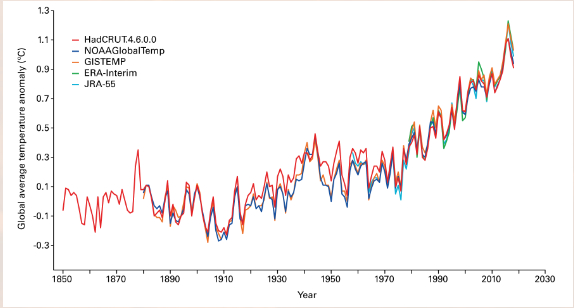
Tech & Sci
12:38, 30-Nov-2018
2018 on course to become fourth hottest year on record
Updated
11:41, 03-Dec-2018
Alok Gupta

The year 2018 is moving on the trajectory to become the fourth hottest year on the record, the World Meteorological Organization (WMO) said on Thursday.
The global average temperature in the year was nearly 1 degree Celsius above 1850-1900, the pre-industrial period.
Twenty warmest years on record happened in the past 22 years, and the top four in the past four years, leading to a sudden increase in extreme weather conditions.
As a result of global warming, incidents of wildfires, melting glaciers, sea-level rise continued to rise in many countries. The Global Mean Sea Level (GMSL) for the period from January to July 2018 has been around 2 to 3 mm higher than for the equivalent period in 2017.
If the current trend continues, the global average temperature will rise by 3 to 5 degrees Celsius by the end of this century, the WMO Provisional Statement on the State of the Climate in 2018 released on Thursday, said.
But researchers warned that the worst is yet to come. According to climate models, if El Nino, a condition that sometimes occurs in the Pacific Ocean, affecting global weather pattern, 2019 is likely to be warmer than 2018.
“These are more than just numbers,” said WMO Deputy Secretary-General Elena Manaenkova.

Global mean temperature anomalies with respect to the 1850-1900 baseline, for the five global datasets /Data source: UK Met Office Hadley Centre
Global mean temperature anomalies with respect to the 1850-1900 baseline, for the five global datasets /Data source: UK Met Office Hadley Centre
“Every fraction of a degree of warming makes a difference to human health and access to food and fresh water, to the extinction of animals and plants, to the survival of coral reefs and marine life, Manaenkova added.
The WMO findings come as a warning for climate action. A large number of countries, during Paris climate talks, agreed to contain global temperature rise within 2 degree Celsius.
Last month, the Intergovernmental Panel for Climate Change (IPCC), in a special report calculated limiting global temperature within 1.5 degrees Celsius is feasible. But meeting this target would require a consensus on curbing emissions.
Concerning emissions, heat-trapping gases, carbon dioxide, methane, and nitrous oxide concentrations reached new highs, last year, according to WMO Greenhouse Gas Bulletin. Under such a scenario, meeting the global temperature rise target is extremely difficult to achieve.
“We are not on track to meet climate change targets and rein in temperature increases,” said WMO Secretary-General Petteri Taalas. “If we exploit all known fossil fuel resources, the temperature rise will be considerably higher,” he said.
(Top Photo: A store burns as the Camp Fire tears through Paradise, California, November 8, 2018. /VCG Photo)

SITEMAP
Copyright © 2018 CGTN. Beijing ICP prepared NO.16065310-3
Copyright © 2018 CGTN. Beijing ICP prepared NO.16065310-3